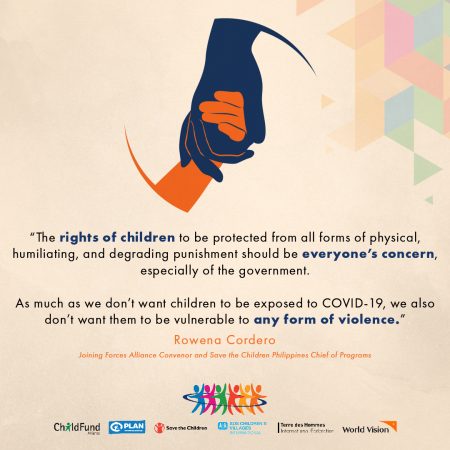
Physical and psychological violence, particularly at home, are among the most pervasive types of abuse experienced by Filipino children. Both can be worsened by the COVID-19 enhanced community quarantine.
In fact, 3 in 5 children have experienced some form of physical violence, the 2016 National Baseline Study on Violence Against Children revealed. Sixty percent of these cases happened in their own homes, with 1 in 2 children experiencing corporal punishment.
“This disturbing figure can exponentially increase, especially now that parents and caregivers are experiencing added stress,” said Rowena Cordero, Joining Forces Alliance Convenor and Save the Children Philippines Chief of Programs. “Children should be protected from experiencing violence at home. And parents need to be supported in coping with stress and in ensuring that parenting practices respect and uphold children’s rights.”
While the quarantine measures imposed by the government help in controlling the spread of COVID-19, it may also unintentionally expose children to increased protection risks.
The economic, health, and security problems resulting from the pandemic may take its toll on the mental health of parents and caregivers. Hence, they may be unable to effectively manage their stress and frustration. As a result, these adults may resort to using physical, humiliating, and degrading punishment on their children.
To prevent this from happening, we urge the government to:
- Ensure timely delivery of social protection and amelioration programs.
- Establish accountability and feedback mechanisms for families and children.
- Provide mental health and psychosocial support for parents and caregivers, through online platforms or hotlines, in coordination with private groups.
- Set up hotlines and online platforms where children and the public can send complaints about child abuse cases.
- Regularly assess child protection risks throughout the COVID-19 response, including disaggregated data of children based on age, sex, and disability.
- Closely monitor children at increased risk of violence, exploitation, abuse, and neglect.
In particular, we call on the Department of Social Welfare and Development to:
- Activate child protection programs and response and referral mechanisms.
- Ensure that protection and social welfare services are adequately funded and are central throughout all the stages of the COVID-19 response.
We also urge all local governments to:
- Set up child-friendly hotlines for reporting and psychosocial counseling.
- Ensure compliance with the DILG Advisory (2 April 2020) on the activation of the Barangay Violence Against Women (VAW) Desk and the Barangay Council for the Protection of Children (BCPC) during the Enhanced Community Quarantine.
- Disseminate information by dovetailing informative leaflets in relief distribution i.e., stress management, how to report child abuse, among others.
“The rights of children to be protected from all forms of physical, humiliating, and degrading punishment in all settings should be everyone’s concern, especially of the government,” said Cordero. “As much as we don’t want children to be exposed to COVID-19, we also don’t want them to be vulnerable to any form of violence.”

